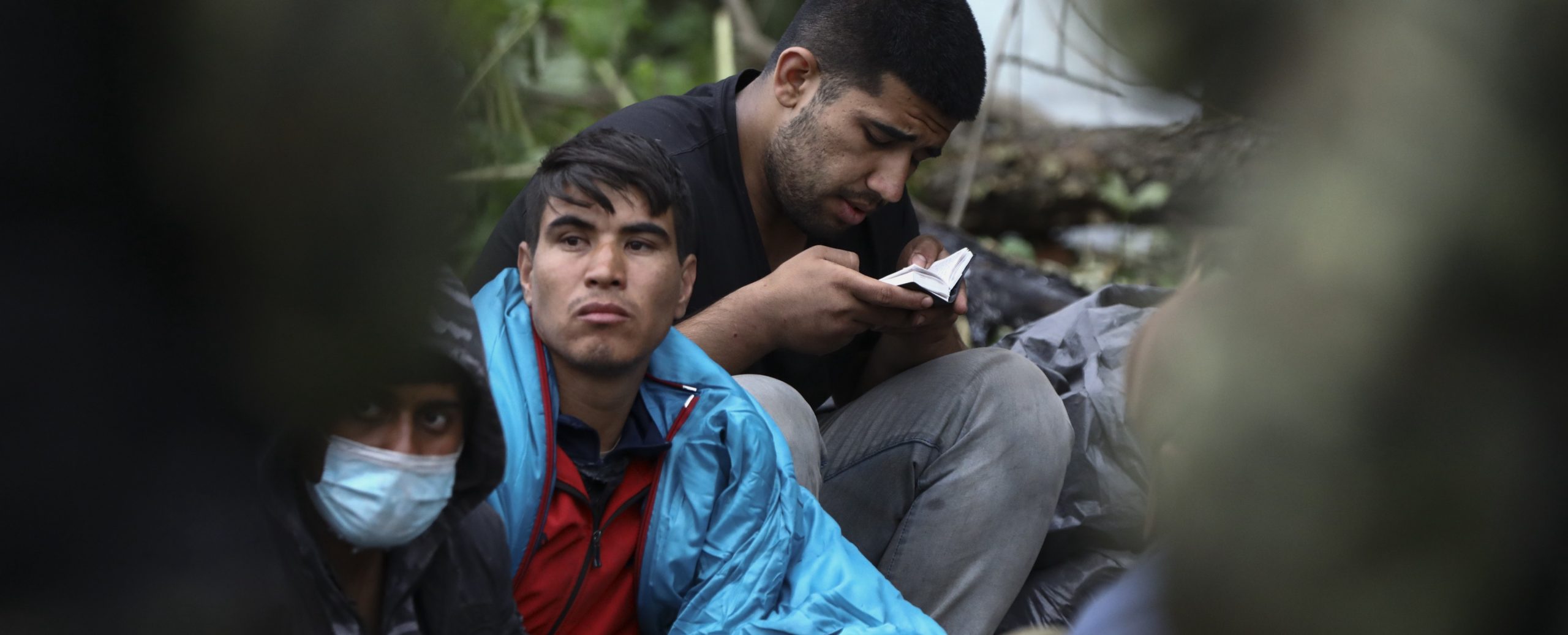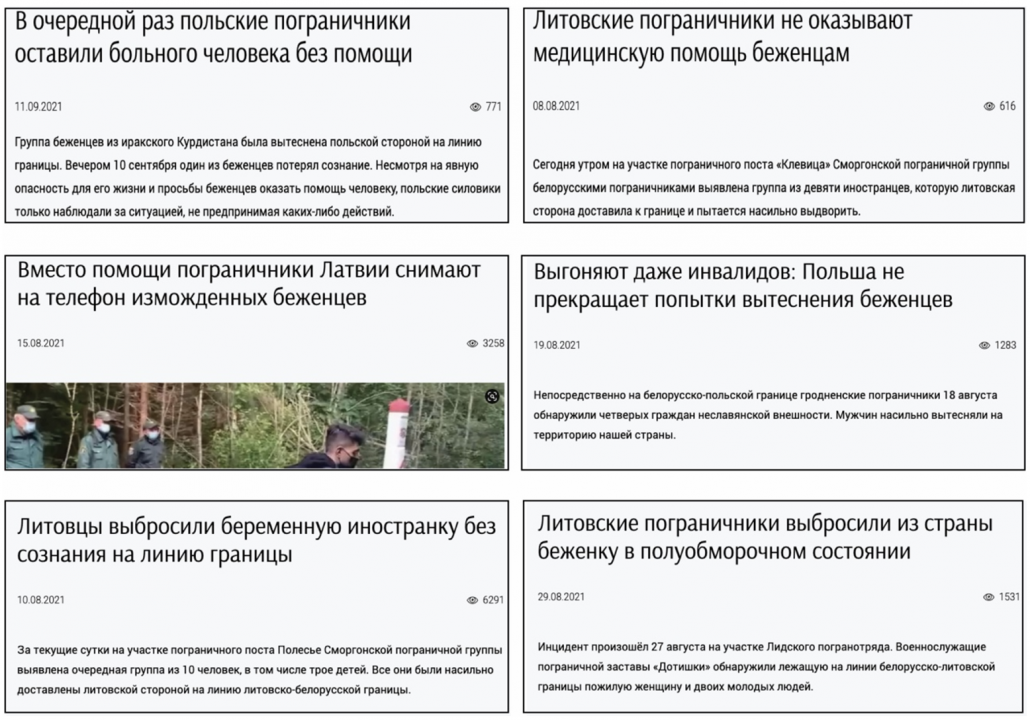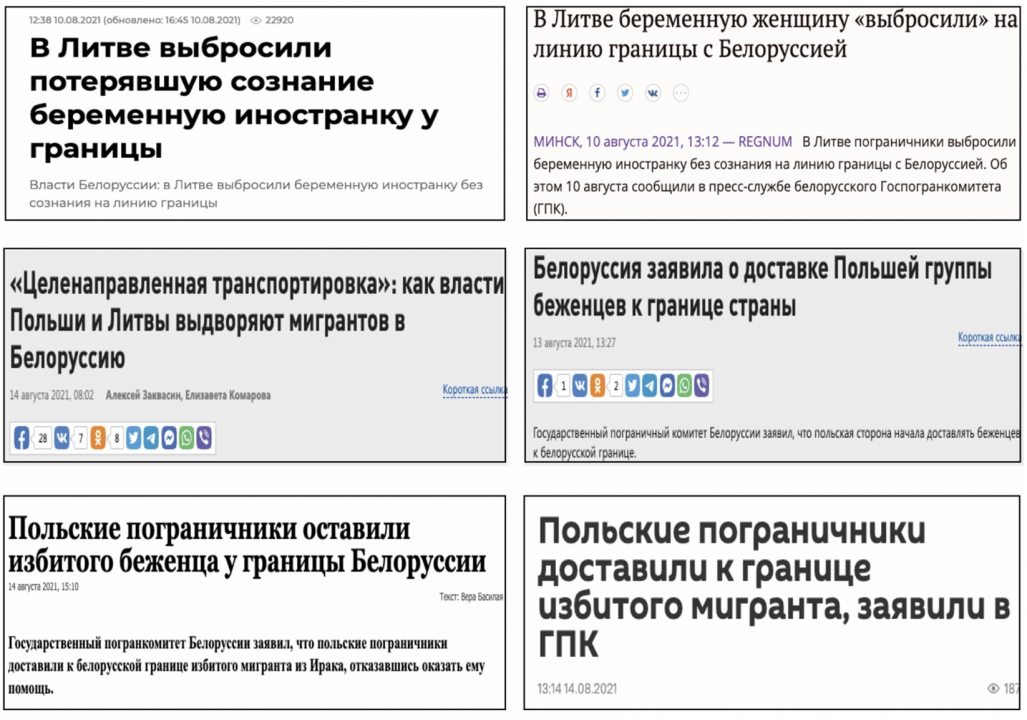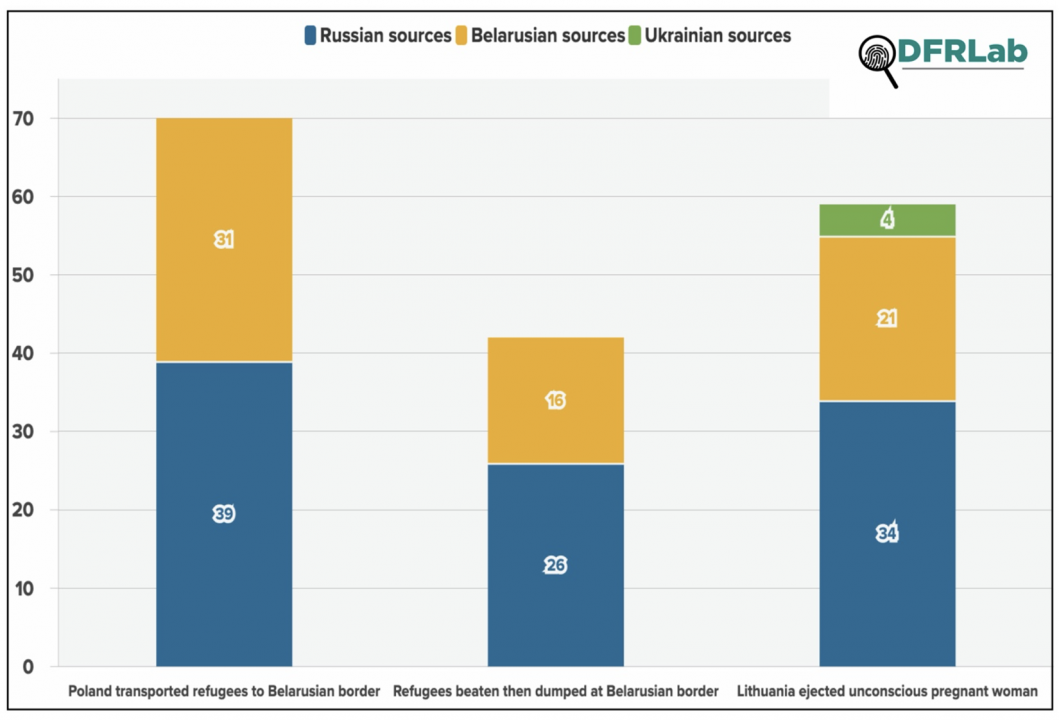
BANNER: Afghan refugees caught in a border standoff between Polish and Belarusian border patrols in Usnarz Gorny, Poland, 20 August, 2021. (Source: Reuters/STR/NurPhoto)
Belarusian authorities have doubled down on a propaganda campaign against Poland, Lithuania, and Latvia, accusing them of inhumane treatment of refugees and migrants, while simultaneously weaponizing immigration to the EU through Belarusian territory.
In response to targeted sanctions imposed on individuals and entities within Belarus by the West, Belarusian authorities moved to ease refugee and migrant transit through the country to the EU-Belarus border. More specifically, there is evidence that Belarusian border guards have facilitated refugee and migrant movement toward the country’s borders with the EU member states Lithuania, Latvia, and Poland. In response, EU officials have broadly referred to the ensuing humanitarian crisis at its borders as a “hybrid attack” by the Lukashenka regime. The escalating rhetoric and actions on both sides have left migrants and refugees caught in the middle.
That said, by ushering migrants and refugees to the EU border, Belarus has created a number of challenges for its neighbors. Along with border security problems, the influx of migrants and refugees has created a humanitarian crisis that has also increased domestic instability in the affected countries, with people protesting for and against their governments’ immigration policies. Alongside these issues is one of optics: when these states push the refugees and migrants back toward Belarus, Belarusian authorities can portray their actions in a negative light while positioning Belarus as morally superior — all while ignoring its own harsh and dehumanizing treatment of the same people.
To that end, the State Border Committee of the Republic of Belarus (GPK) has been publishing photo and video imagery on an almost daily basis depicting the situation on the country’s western border, sometimes pushing misleading or false information alongside them. These reports are then amplified by Kremlin-aligned and Kremlin-funded media in Russia. Meanwhile, against the backdrop of an influx of refugees and migrants, Poland, Lithuania and Latvia have declared a state of emergency on Belarus border, which prohibits activities of media organizations near the border, raising serious questions regarding press freedom. As journalists in the EU member countries are not able to report on the developments on the border, media outlets in these countries sometimes have to rely on GPK materials as their sole source of information.
Refugees and migrants as geopolitical pawns
Relations between Belarus and its Western neighbors have been deteriorating since August 2020, when Alyaksandr Lukashenka announced he had won the country’s presidential elections, which the opposition and foreign officials disputed as “rigged” or “flawed” — claims supported in part by open-source evidence. The questionable election results led to nationwide protests, which themselves resulted in a violent crackdown by the state. In response to this dramatic turn of events in Belarus, the West imposed sanctions on Belarus, with Baltic countries and Poland playing a key role in the effort. They also granted refuge to hundreds of dissidents who fled Belarus, including opposition leader Sviatlana Tsikhanouskaya.
After the Lukashenka regime forced a commercial airliner flying over Belarusian territory to land in order to arrest two dissidents, the EU implemented another round of targeted sanctions. Against this backdrop, the regime retaliated by weaponizing the plight of refugees and migrants, encouraging their movement toward Belarus’s borders with its EU neighbors as a means of fostering political instability. In response to the dramatic uptick in migrants and asylum-seekers, Lithuania, Latvia, and Poland enacted states of emergency along their respective borders with Belarus and commenced construction of metal fences topped with barbed wire.
Caught between the feuding countries are refugees fleeing persecution at home and seeking asylum, alongside migrants seeking economic opportunities, with Belarus exploiting their plight and its EU neighbors struggling to handle them with sensitivity as they cross the border. In numerous cases, this has taken the form of one country’s border security physically forcing them toward opposing borders. For instance, one video showed a Belarusian border guard pushing migrants toward the Lithuanian border; in another video, a Belarusian border guard can be seen giving a command to walk toward Lithuania. Meanwhile, Amnesty International digitally reconstructed an incident in which Polish security personnel forced migrating families back into Belarus.
In another incident, the Polish border patrol published photo evidence showing that Belarusian border personnel had facilitated the transport of refugees to the Poland-Belarus border. A migrant from Cameroon who managed to cross the border told the BBC that the Belarusian border guard monitors the Polish border guard’s movement along the border, enabling them to direct refugees and migrants towards specific spots to cross at night to avoid getting caught. Having seen the latest influx of refugees and migrants as Lukashenka’s effort to destabilize neighboring countries, Poland, Lithuania and Latvia introduced controversial pushbacks against people crossing border from Belarus. This led to UNHCR, the UN refugee agency, criticizing Poland regarding its treatment of migrants and refugees. After the death of four people in September 2021, UNHCR and the International Organization for Migration issued an angry statement in which they reminded the EU member states, “Pushbacks endanger lives and are illegal under international law.”
Information war by press release
Beyond the intentional use of refugees and migrants to create political instability, Belarus is also actively waging an information war against Latvia, Lithuania, and Poland. While the EU countries still must contend with documented cases of mistreatment and restricting aid agency access, the Lukashenka regime and its border enforcement agency have falsified or exaggerated individual instances of alleged mistreatment as a means of rhetorical attack.
The GPK, which manages Belarus’s borders, has recently become the driving force of state propaganda against the neighboring countries. They regularly publish photo and video materials allegedly documenting inhumane treatment of refugees and migrants by the three countries’ border guards. The DFRLab counted 41 press releases published by the GPK between August 8 and September 21, 2021 allegedly depicted the mistreatment of refugees by Polish, Latvian, and Lithuanian border guards. Eighteen of them were written about Lithuania, with 17 focused on Poland and six regarding Latvia.
Almost half of these stories accused EU border guards of using force against migrants and refugees, followed by stories related to purportedly pushing them back to the border with Belarus. The situation has been further aggravated by the current states of emergency, which prevent journalists in Poland and Lithuania to go to the border and verify the GPK’s allegations.
Some of those stories claimed that Polish and Lithuanian border guards do not provide medical aid to refugees and that they forcefully eject people with disabilities and pregnant women from their territory. In one such case on September 19, 2021, the GPK reported that they found a body of dead woman near the Polish border and also supposedly observed “clear signs of dragging a body from Poland to Belarus.” In response, Polish authorities stated that Polish border guards noticed that there was a group of migrants on the Belarusian side of the border, including an unconscious woman. The border guards notified Belarusian counterparts about it, but when they arrived to help her, she was already dead. The circumstances surrounding her death remain unverified due to Polish media restrictions. By the end of September 2021, at least six people had been found dead along the Polish-Belarus border.
Amid these allegations, multiple videos appeared on GPK’s website showing Belarusian doctors providing medical aid to refugees and migrants, positioning itself as moral superior over its neighbors.

After GPK publishes press releases, they are often heavily amplified by Belarusian and Russian state-controlled media, which use them to support propaganda targeting the Baltic countries and Poland. The DFRLab identified the three most widely circulated stories from GPK’s website: that a Lithuanian border guard carryied an unconscious pregnant woman away from the country’s border with Belarus; claims that Lithuanian and Polish border guards had beaten refugees before kicking them out; and that Poland was transporting refugees to the Belarusian border in response to Belarus’s facilitating transport.
Following GPK’s release of these statements, pro-Kremlin media outlets in Russia amplified the narratives.

Although these claims were challenged by Polish and Lithuanian authorities, Belarusian and Russian media continued to amplify them. Polish media restrictions and denial of aid worker access continue to make it difficult to confirm or debunk these claims. On September 28, 2021, Polish police briefly arrested three journalists for entering the border zone; they were released after a Polish court fined them 2,000 zloty, roughly equivalent to USD $500.
Using Google’s Advanced Search function, the DFRLab found all articles in Russian mentioning the titles for the three above-mentioned press releases. Employing SEOquake to download the search results, the DFRLab manually filtered out news stories that refuted the GPK’s claims to focus on those articles amplifying them. According to this analysis, Russian state-owned and pro-Kremlin outlets amplified the GPK narratives more actively than Belarusian outlets, reflecting Russia’s interest in amplifying narratives that undermine the reputations of EU member states.

Amplification of GPK stories via Telegram
The DFRLab previously reported that Belarusian state institutions use Telegram to counter the reach of anti-Lukashenka Telegram channels. The GPK similarly posts updates to its own official Telegram channel; these stories are then amplified by multiple anonymous pro-government channels, as well as others managed by media outlets in both Belarus and Russia. The audience for the GPK’s official Telegram channel has steadily grown since May 2021, with an influx of new subscribers toward the end of that month after Belarus banned most of its own citizens from leaving the country. The number of channel views skyrocketed between August 10–13, when it posted press releases regarding Lithuania’s alleged forced removal of an unconscious pregnant woman and Poland reportedly pushing back refugees and migrants.

The DFRLab also selected three combinations of keywords in Russian — “избитые беженцы” (“beaten refugees”), “беременная иностранка” (“pregnant foreigner,” the most common phrase used in reference to the allegedly unconscious pregnant woman), and “насилие над мигрантом” (“violence against migrants”) — to examine the spread of the GPK messages on Telegram. Using Telegram Analytics’ advanced search function, the DFRLab found that “избитые беженцы” (“beaten refugees”) garnered 228 mentions with a total reach of over 760,000 views across 135 channels. “Беременная иностранка” (“pregnant foreigner”), meanwhile, was mentioned 160 times on 129 channels, with a total reach of over 310,000 views. Lastly, “насилие над мигрантом” (“violence against migrants”) appeared 111 times on 85 channels, garnering over 544,000 views.
Lithuania, Latvia, and Poland have refuted some of the GPK’s claims regarding the situation on the border. For example, in response to the GPK’s video about forcefully removing an unconscious pregnant woman into the “no man’s land” between Lithuania’s and Belarus’s borders, the Lithuanian State Border Guard Service released a video depicting the same scene, but taken from a different camera angle. The GPK press release claimed that the woman was taken to a Belarusian hospital “in grave condition.” As the DFRLab previously verified, the “unconscious pregnant woman” stood up and walked away herself after Lithuanian border carried her. It has also not been confirmed whether she was pregnant. The one thing that does not seem to be in dispute is that Lithuanian border guards did indeed carry the woman during a border operation.
The GPK also released a video allegedly showing Polish border guards dropping refugees back along the Poland-Belarus border. According to the Polish Ministry of Interior, between July and August, border guards prevented 1,342 people from crossing into Polish territory 758 people were transferred refugee centers in Poland for asylum claims processing, and 380 others were deported from Poland. On September 20, a spokesperson for the Polish border patrol admitted to a Dutch TV program that border guards had started pushing back people who had snuck across the border, though they would consider asylum applications for refugees who entered via official Polish border check-points.
Cite this case study:
Givi Gigitashvili, “Belarus criticizes EU border tactics, with migrants caught in the middle,” Digital Forensic Research Lab (DFRLab), October 13, 2021, https://medium.com/dfrlab/belarus-criticizes-eu-border-tactics-with-migrants-caught-in-the-middle-873fe764f94f.

